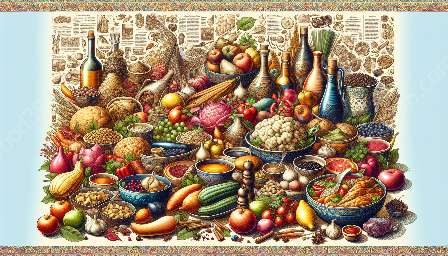Humans have been brewing and fermenting alcohol and other beverages for thousands of years. This ancient practice is deeply intertwined with food traditions, rituals, and the evolution of food culture.
Understanding Ancient Brewing and Fermentation
Ancient civilizations, from Mesopotamia to Egypt, China, and the Americas, discovered the transformative power of fermentation. Fermenting grains, fruits, and honey allowed them to create alcoholic beverages that not only provided nourishment but also played a central role in their social, religious, and ceremonial traditions.
Ancient Food Traditions and Rituals
The production and consumption of fermented beverages were often accompanied by elaborate rituals and festivities. In many cultures, the act of brewing and sharing these drinks was a sacred and communal experience. Beer, for example, held significance in Mesopotamian religious ceremonies and was even considered a gift from the gods.
Ancient societies used brewing and fermentation to connect with their spiritual beliefs and strengthen social bonds through communal feasting and celebrations.
Origin and Evolution of Food Culture
The origins of beer and other fermented beverages are intrinsically linked to the development of food culture. As ancient communities transitioned from nomadic hunter-gatherers to settled agrarians, they began cultivating grains and fruits for brewing and fermenting.
This shift not only provided a reliable source of nutrition but also led to the establishment of communal gathering spaces and early forms of social organization. The sharing of fermented drinks became a cornerstone of hospitality and cultural exchange, shaping the evolution of food culture and dietary practices.
Impact on Human History
Exploring ancient brewing and fermentation practices offers valuable insights into the interconnected nature of food traditions, rituals, and cultural evolution. These practices played a pivotal role in shaping the social, religious, and economic landscapes of early societies, leaving a lasting impact on human history.
From the communal brewing rituals of ancient Sumer to the monastic traditions of medieval Europe, the art of fermentation has permeated diverse cultures and continues to influence modern-day food and beverage production.
Rediscovering Ancient Techniques
Today, there is a resurgence of interest in ancient brewing and fermentation techniques, driven by a desire to reconnect with traditional food practices and explore the rich tapestry of flavors and aromas that defined early culinary traditions.
By rediscovering and reviving ancient recipes and methods, contemporary brewers and enthusiasts are tapping into a deeper understanding of our collective culinary heritage and embracing the enduring legacy of ancient brewing and fermentation.
Conclusion
Ancient brewing and fermentation practices serve as a captivating bridge between the past and present, offering a glimpse into the cultural, spiritual, and culinary dimensions of early human societies. Through the exploration of these practices, we gain a deeper appreciation for the intricate tapestry of food traditions, rituals, and the evolution of food culture.


